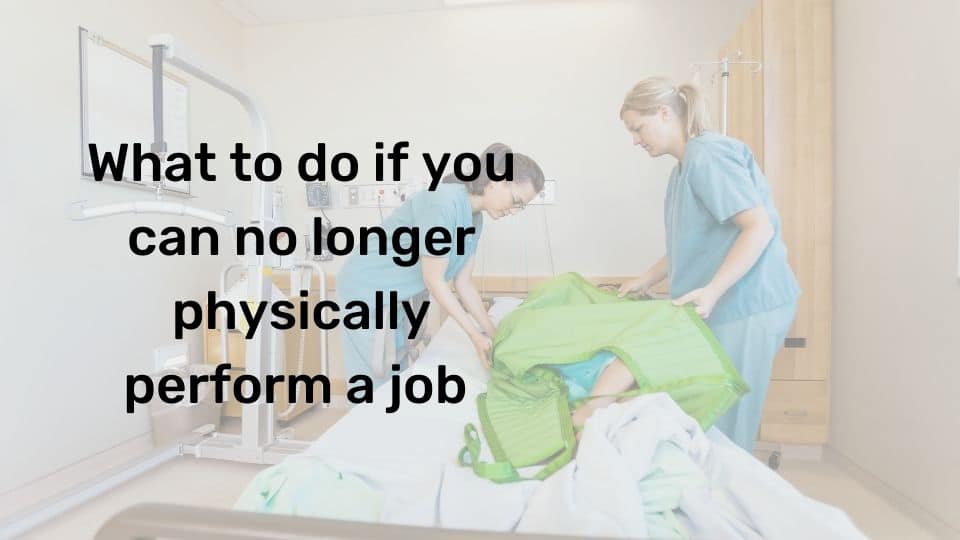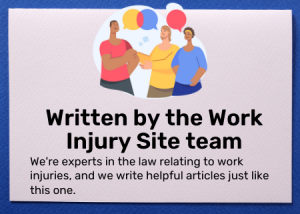What if you can’t physically do your job anymore?
There are some options open to you if you can’t physically do your job anymore in Victoria.
You may wish to see if reasonable adjustments can be made to your current job to assist you, or ask to be moved to a role with the employer that you can perform.
You may also consider finding a new job that you can do, which may require you to undergo some study or retraining.
You could also consider the lodgement of a WorkCover claim or a TPD or income protection claim.
Table of Contents
Can reasonable adjustments be made?
Lets say that you have bad knees and that your job requires a significant amount of standing and being on your feet.
You are able to ask your employer to make reasonable adjustments.
So in this instances, a reasonable adjustment may be to provide you with some rubber matter to prevent you from having to stand on a concrete floor for the duration of your shift.
Obviously you should be guided by medical advice in this regard.
Another example is if you have back problems and your job requires heavy lifting, is there machinery that the employer could utilise to assist you? Could there potentially be another way to work (eg: another employee could assist you).
Could the employer change your role?
If you wish to stay with this employer but you physically can’t keep up with the demands of your current role, you can ask the employer to consider changing your role.
They do not have to oblige, however many will if they want to keep you around.
Retraining or study
You might consider undergoing retraining or pursuing some study.
It is possible that if you speak to your current employer, they may be happy for you to undergo retraining or some study so you can fill a different role within the company.
Or, you may wish to undergo retraining or study so you can find a new job.
If you elect to lodge a WorkCover claim (referred to below), then keep in mind that this is something you should discuss with the insurer as they may be able to contribute towards retraining and/or study.
Finding a new job
The obvious option which you might have considered is leaving this job and finding a new one.
So if you’re working a job that is perhaps too physical for you and you’re struggling, you may wish to find a job that is within your physical capabilities.
Lodging a WorkCover claim
One option open to people if they are no longer able to work is the lodgement of a WorkCover claim (to be clear, a person can still lodge and have accepted a WorkCover claim even if they can work).
It is very important that people understand that in order to have a WorkCover claim accepted, you do not need to have an injury that resulted from a single incident at work.
Yes, you are likely to have a WorkCover claim accepted if for example you are lifting a heavy box and you hurt your shoulder.
However, WorkCover claims can be accepted on the basis of a deterioration over time.
Copyright notice – this is original content from TheWorkInjurySite.com.au.
For example, say you are working in a job that requires heavy lifting or repetitive movements of some kind and that as a consequence over time your shoulder gradually got worse and worse.
You can also claim more than one injury.
If you’ve got an injury to your shoulder and to a knee, if there is some connection to work all of these injuries can be considered to be work-related.
Sometimes you may be able to list all injuries on the one WorkCover claim, whereas other times it may be appropriate to lodge a separate claim or claims.
If you want to read more about what can be considered a work related injury you can do so on this page.
Even if you haven’t mentioned the injury to your employer, this does not prevent you from lodging and having accepted a WorkCover claim.
This is even if the injury was suffered years ago.
You can still lodge and have accepted a WorkCover claim.
To initiate a WorkCover claim you’ll have to complete and lodge a WorkCover claim form.
The claim will then get determined by the WorkCover insurer.
You can read about the WorkCover claim process here.
Unfortunately, while the claim is being determined which will take about a month, if you are not able to work you will not be entitled to any income payments from WorkCover.
So you may have to use leave entitlements such as sick leave, annual leave or long service leave and if the WorkCover claim is accepted, you can be backpaid or your leave recredited.
If your WorkCover claim is accepted, then you can read this page which outlines what you’re entitled to.
In a nutshell, if you are not able to work, It’s likely that you may need medical treatment for an injury or injuries and the WorkCover insurer will be responsible for covering the reasonable cost of medical treatment related to your injury or injuries.
This is important because with appropriate medical treatment, particularly specialist medical treatment, some people may actually be able to get back to work, or at least to some work.
Also, you may also be entitled to the payment of weekly payments which can be paid for a total of 130 weeks and sometimes more if you’ve got no work capacity which is likely to continue indefinitely.
You can read about weekly payments here.
There’s also two lump sum claims under the WorkCover scheme, the first being an impairment benefit claim and the second being a common law claim.
In relation to an impairment benefit claim, this does not take into consideration the fact that you are not able to work any more.
A common law claim does however. Part of what you can be compensated for under a common law claim is for loss of earnings.
If your WorkCover claim is rejected, there could be a number of reasons as to why this might be the case and you can read more about that on this page.
You will have the option of appealing the decision to reject your claim should you wish and this page outlines how you can go about that.
If you have a WorkCover claim and you want to quit your job, this page will assist.
TPD claim
If you’re not able to work, you can potentially pursue a total and permanent disablement claim through your superannuation.
Some people have a TPD insurance component attached to their superannuation.
Some people may have taken out TPD insurance separate to their superannuation.
One thing to consider with TPD claims however is that before you can make a claim you will generally need to be out of work for a certain period of time as specified in the TPD policy. This is usually for a minimum of six months.
So if you have no other options and you’re just relying upon a TPD claim, it is possible that you may not receive income for six months or more.
You also need to factor in the fact that TPD claim will usually take a number of months to be determined by the fund/insurer on top of this so again if the TPD claim is the only option you’re relying on for income you may be without income for a fairly significant amount of time which obviously is not ideal.
Income protection claim
Similar to a TPD claim, some people have income protection insurance attached to their super.
Other people may have obtained a separate income protection policy.
If you’re unable to work income protection will pay you what is normally a fixed income for a specified period of time specified under your policy.
Centrelink
If you’re not able to physically do your job any more, you may be able to obtain assistance from Centrelink.
The two most obvious payments are disability benefits and new start allowance.
Given the amounts that Centrelink pay however and take into account the other options, Centrelink should be an option of last resort in our opinion and only accessed if none of the other options outlined on this page are suitable.
If you’ve reached the age for which you are qualified to receive the aged pension (currently 66, scheduled to increase to 67 in 2023) then this is another option open to you via Centrelink. However keep in mind that the aged pension is also asset tested and so not everyone is entitled to receive it.
TAC claim
This option won’t apply to many people, but it still worthwhile mentioning.
If you’ve been involved in a motor vehicle accident and it is impacting your ability to do your job, then you need to be aware that the TAC have a range of benefits that you may be able to claim.
You can obtain payment for medical and like expenses.
You’ll also be entitled potentially to the payment of income benefits for up to 3 years post accident or three years from when the injury sustained in the accident manifests itself.
Some people can obtain payments be on three years if they are assessed as having an entry or a collection of injuries and meet a certain threshold level of impairment.
People also able to pursue common law claim which will take into account the fact that they can no longer work and their loss of earnings.
Conclusion
If you are not able to physically do your job any more, then there are a few options.
If you think that some adjustments within the workplace may assist, then you can speak to your employer about making his adjustments for you.
You can also ask them about potentially being moved into a different role.
If however that doesn’t work then you may need to look at another job that is in your physical capabilities. You could also consider retraining or pursuing some study.
You could also consider the lodgement of a WorkCover claim, a TPD or income protection claim, accessing assistance from Centrelink or, if it is relevant, via a TAC claim.








